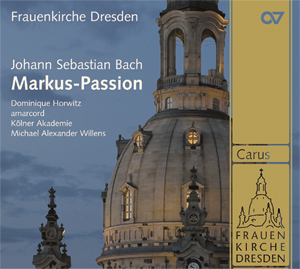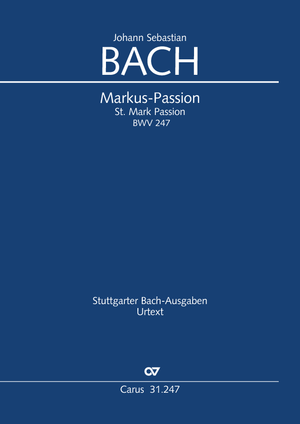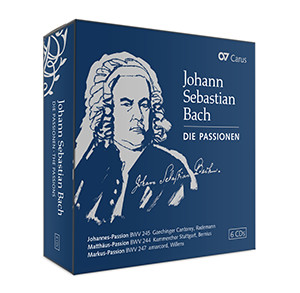
Contents
-
Composer
Johann Sebastian Bach
| 1685-1750Johann Sebastian Bach is one of the most important composers of Western music history. He came from a widely ramified musical dynasty, which produced numerous musicians and organists in the Thuringian-Saxon area.
Bach vocal
Ever since Carus-Verlag was founded in 1972, publishing the music of Johann Sebastian Bach has been a special focus for us. In the 2017 Reformation anniversary year we completed the Bach vocal project. Bach's complete sacred vocal works are now available in modern Urtext editions, together with performance material. A complete edition of all the full scores is also available in a high quality box set. Personal details
-
Vocal score arranger
Horst Hempel
| 1934-1988
-
Vocal score arranger
Paul Horn
| 1922-2016Paul Horn war ein deutscher Kirchenmusiker, Organist, Komponist und Musikwissenschaftler. Er studierte Kirchenmusik und Orgel an der Evangelischen Kirchenmusikschule Esslingen am Neckar bei Hans-Arnold Metzger und Musikwissenschaft, Theologie und Geschichte an der Universität Tübingen. Seine berufliche Laufbahn begann als Kantor an der Evangelischen Michaelskirche in Stuttgart-Degerloch. 1954 wurde er Kantor an der Evangelischen Stadtkirche Ravensburg, eine Position, die er bis zu seiner Pensionierung innehatte. Als Musikwissenschaftler arbeitete Horn bis ins hohe Alter eng mit Carus zusammen. So stammen zahlreiche Carus-Klavierauszüge aus seiner Feder. Personal details
-
Arranger
Diethard Hellmann
| 1928-1999
-
Preface writer
Andreas Glöckner
-
Ensemble
amarcord
An unmistakable sound, breathtaking blend, tremendous sense of musical assurance and a good portion of charm and wit are amarcord’s special hallmarks. The group’s extremely diverse and wide-ranging repertoire encompasses medieval songs, Renaissance madrigals and masses, compositions and cycles of works from the European Romantic and 20th century as well as a cappella arrangements of folk songs from all over the world, and well-known rock, pop, soul, and jazz songs. The ensemble has won prizes at numerous international competitions. In 2002 amarcord won the Deutscher Musikwettbewerb. Alongside the Gewandhaus Orchestra and St. Thomas’s Choir, amarcord is one of the most important representatives of the music city of Leipzig at home and abroad. The group is a frequent guest at leading music festivals. Numerous concert tours have taken the singers to over fifty countries and to almost every continent in the world. In association with the Goethe-Institut they have given guest performances in Australia, South East Asia, the Middle East, Russia, Africa, and Central America. The International Festival for Vocal Music "a cappella" (www.a-cappella-festival.de), inaugurated by amarcord in 1997, has become one of the most important festivals of its kind under the group’s artistic direction. Numerous CDs impressively document the different facets of amarcord’s repertoire, and have won many prizes such as ECHO Klassik (2010, 2012), the International Classical Music Award, Supersonic Award and the Contemporary A Cappella Recording Award. Personal details
-
Ensemble
Kölner Akademie
The Kölner Akademie has made a name for its distinctive and historically accurate performances of music from the 17th to 21st centuries. By using original orchestral seatings, instrumentation appropriate to the work (whether modern or historical instruments) and critical editions, the ensemble strives to do justice to the composer’s original intentions. The Kölner Akademie performs at leading international festivals and has received the highest accolades for its performances in Germany, Austria, France, Spain, Holland, Italy, Belgium, Estonia, Sweden, Norway, and Iceland. The ensemble’s CD series “Forgotten Treasures,” highly praised in the music press, now stands at ten recordings of a planned total of fifteen. These include world premiere recordings of works by lesser-known composers including Cru sell, Danzi, Pichl, Vanhal, Wilms, Romberg, Neu - komm, Fischer, Kunc, Jeanjean, D’Alvimare and Streibelt. In the fall of 2009, the Kölner Akademie began recording a complete cycle of Mozart piano concertos with Ronald Brautigam. Personal details
-
Conductor
Michael Alexander Willens
Michael Alexander Willens, artistic director and conductor of the Kölner Akademie received B.M and M.M degrees at the Juilliard School in New York, where he studied conducting with John Nelson. He has also studied with Jacques-Louis Monod and Leonard Bernstein. His broad experience has given him an unusual depth of background and familiarity with performance practice styles ranging from Baroque, Classical and Romantic through Contemporary. In addition to performing the standard repertoire, Michael Alexander Willens is dedicated to perfoming the works of lesser known contemporary American composers as well. He has appeared as a guest conductor in Germany, Poland, Holland, Brazil and Israel. Personal details
-
Artist
Dominique Horwitz
| 1957Dominique Horwitz was born in Paris in 1957. He grew up in France before moving to Germany with his family in 1971. He made his TV debut at the age of nineteen, and the following year made his film debut in Peter Lilienthal’s David. From 1979 he worked mainly in the theatre, first in Tübingen, then at the Staatsschauspiel in Munich, and the Thalia Theater in Hamburg. In 1989 he returned to television in Dieter Wedel’s film Der große Bellheim. Dominique Horwitz came to international attention in 1992 in the main role in Josef Vilsmaier’s film Stalingrad. As well as his numerous film and television appearances, he continues to perform on the stage, including with the Berliner Ensemble, at the Deutsches Theater Berlin, Schauspielhaus Zürich, and Hamburg Kammerspiele. A versatile performer, he is also an accomplished singer and has performed in The Threepenny Opera by Brecht and Weill, as well as chansons by Jacques Brel. Personal details
Reviews
Untitled Document
[...] Bach-Freunde werden an diesem speziellen Kleinod ihre ungetrübte Freude finden.
Christian Albrecht
musik&liturgie, 3/10
[...] eine großartige Einspielung der Markus-Passion, die als Co-Produktion des Carus-Verlags mit der Stiftung Frauenkirche Dresden realisiert wurde, und die ich persönlich für die zurzeit beste Einspielung des Werks aus jüngerer Zeit halte. Ein instruktives CD-Booklet, das zahlreiche Erläuterungen zum Rekonstruktionsversuch wie zu den einzelnen Interpreten enthält, rundet den hervorragenden Gesamteindruck ab. [...]
Jan Bechtel
Glarean Magazin, 24. August 2010
[...] This excellently presented and performed release of the St. Mark’s Passion from Carus includes a fine and informative essay together with full German texts with English translations. Bach collectors and lovers of sacred music should not hesitate.
Michael Cookson
MusicWeb International, Mai 2010
[...] Dominique Horwitz [...] gelingt eine gute Balance zwischen flüssigem Erzähltempo und kontrastreichen, emotionalen Passagen der wörtlichen Rede. Das Ensemble Amarcord – durch vier Damen verstärkt – sowie die Kölner Akademie tragen zu diesem insgesamt schlüssigen Gesamtkonzept bei und musizieren auf hohem Niveau, das durch die wunderbare Akustik der Dresdner Frauenkirche voll zur Geltung kommen kann. [...]
Ulrich Barthel
Neue Chorzeit, März 2010
[...] Die gesprochenen Texte wie auch der insgesamt eher ruhige Charakter des musikalischen Torsos führen zu einer vergleichsweise meditativen Version des Passionsgeschehens, was zwar ungewöhnlich, aber keineswegs ohne Reiz ist.
Michael Wersin
RONDOplus, 2/2010
[...] Auch musikalisch ist die Aufnahme des Carus-Verlags aus der Dresdner Frauenkirche übrigens absolut hörenswert: In Kammerbesetzung wird die Leidensgeschichte zu einer überraschend intimen Angelegenheit und hat kaum etwas von dem Spektakelhaften der beiden erhaltenen großen Bachpassionen. [...]
Jörg Königsdorf
tagesspiegel.de, 7.2.2010
Frequent questions about this work
 There are no questions and answers available so far or you were unable to find an answer to your specific question about this work? Then click here and send your specific questions to our Customer Services!
There are no questions and answers available so far or you were unable to find an answer to your specific question about this work? Then click here and send your specific questions to our Customer Services!








